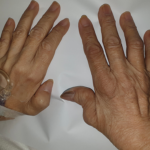Facts about Managing Psoriatic Arthritis
Managing psoriatic arthritis is quite paramount because living with psoriatic arthritis can be a challenging journey, but with the right strategies and a positive mindset, you can take control of your condition and lead a fulfilling life.
In this comprehensive guide, we will explore the various aspects of managing psoriatic arthritis and empower you with valuable insights and practical tips.
Whether you are newly diagnosed or seeking ways to enhance your current management approach, this article is here to guide you through the maze of possibilities.
Understanding Psoriatic Arthritis
Psoriatic arthritis is a chronic autoimmune condition that affects millions of people worldwide. It is characterized by inflammation in the joints and often accompanied by the skin condition psoriasis.
Understanding the underlying causes, symptoms, and the impact it can have on your daily life is crucial in formulating an effective management plan.
Psoriatic arthritis can manifest differently in individuals, with symptoms ranging from mild to severe. Common symptoms include
- Joint pain
- Stiffness
- Swelling
- Skin lesions
It is essential to consult with a healthcare professional for an accurate diagnosis and to rule out other possible conditions.
Diagnosing Psoriatic Arthritis.
Early and accurate diagnosis is crucial for effective management of psoriatic arthritis. A healthcare professional will evaluate your medical history, conduct a physical examination, and may order imaging tests, blood tests, or joint fluid analysis to confirm the diagnosis.
Additionally, they may assess the severity of your symptoms and the impact on your quality of life using standardized assessment tools. Collaborating closely with your doctor and providing comprehensive information about your symptoms will help in the accurate diagnosis of psoriatic arthritis.
Developing an Individualized Treatment Plan

Psoriatic arthritis is a complex condition, and there is no one-size-fits-all approach to treatment. Your healthcare team will work with you to develop a personalized treatment plan based on the severity of your symptoms, overall health, and personal preferences.
Treatment options for psoriatic arthritis include medications such as nonsteroidal anti-inflammatory drugs (NSAIDs), disease-modifying antirheumatic drugs (DMARDs), biologics, and corticosteroids.
Physical therapy and occupational therapy may also be recommended to improve joint function and mobility.
It is crucial to have open and honest communication with your healthcare team, reporting any changes in symptoms or side effects of medications. Regular monitoring and adjustments to your treatment plan are essential to ensure optimal management of psoriatic arthritis.
Lifestyle Strategies for Managing Psoriatic Arthritis
Beyond medical interventions, adopting healthy lifestyle strategies can significantly contribute to managing psoriatic arthritis and improving your overall well-being.
Maintaining a healthy weight is essential as excess weight puts additional strain on your joints.
Adopting an anti-inflammatory diet rich in fruits, vegetables, whole grains, and lean proteins can help reduce inflammation and support overall health. Additionally, limiting processed foods, sugar, and saturated fats is beneficial.
Regular exercise is crucial for managing psoriatic arthritis. Low-impact activities such as swimming, cycling, and walking can help improve joint flexibility, reduce pain, and strengthen muscles.
It is important to find a balance between staying active and resting to avoid overexertion.
Stress management techniques such as mindfulness, meditation, deep breathing exercises, and engaging in hobbies or activities you enjoy can help reduce stress levels and improve overall well-being. Prioritizing adequate rest and sleep is also vital to support the body’s healing and recovery processes.
Nurturing Your Emotional Health
Living with a chronic condition like psoriatic arthritis can have a significant impact on your emotional well-being. It is essential to prioritize your mental health and find healthy coping mechanisms to navigate the emotional challenges that may arise.
One effective approach is practicing mindfulness, which involves focusing on the present moment and accepting it without judgment. Mindfulness techniques, such as meditation and deep breathing exercises, can help reduce stress, anxiety, and depression associated with psoriatic arthritis.
Seeking support from loved ones, friends, or joining support groups can provide a valuable source of emotional support.
Sharing your experiences, concerns, and triumphs with others who understand can help alleviate feelings of isolation and provide practical advice for managing the emotional impact of psoriatic arthritis.
In some cases, professional counseling or therapy may be beneficial. A therapist can help you develop coping strategies, navigate the emotional challenges of living with a chronic condition, and provide a safe space to express your feelings and concerns.
Empowering Yourself through Self-Care
Self-care plays a vital role in managing psoriatic arthritis and promoting overall well-being.
Here are some self-care practices to consider:
Proper skin and nail care: Psoriatic arthritis often presents with skin and nail involvement. Regularly moisturizing your skin, using gentle cleansers, and keeping your nails trimmed and clean can help manage these symptoms.
Joint protection techniques: Simple modifications in daily activities can help protect your joints and minimize pain. This includes using assistive devices, maintaining good posture, practicing proper body mechanics, and avoiding repetitive movements that strain your joints.
Managing fatigue: Fatigue is a common symptom of psoriatic arthritis. Listening to your body and pacing yourself throughout the day can help conserve energy. Prioritizing rest breaks, practicing relaxation techniques, and engaging in activities that recharge you can minimize fatigue.
Balancing activity and rest: Finding the right balance between staying active and getting adequate rest is essential. Listen to your body and adjust your activity level accordingly. Remember that rest is not a sign of weakness but a necessary component of self-care.
Exploring complementary therapies: Some individuals find relief from complementary therapies such as acupuncture, massage, or herbal remedies.
While these approaches may not have scientific evidence to support their effectiveness for psoriatic arthritis specifically, they may provide additional support and enhance overall well-being. Consult with your healthcare team before trying any new therapies.
Seeking Support and Community
Connecting with others who share similar experiences can provide valuable support and a sense of belonging. Consider joining local or online support groups dedicated to psoriatic arthritis.
These communities offer a safe space to share experiences, exchange practical tips, and find emotional support.
Patient advocacy organizations can also be an excellent resource for information, educational materials, and events related to psoriatic arthritis. They often provide opportunities to connect with experts in the field, access research updates, and participate in advocacy efforts.
Conclusion
Managing psoriatic arthritis is a journey that requires resilience, determination, and a comprehensive approach.
By understanding the condition, partnering with healthcare professionals, adopting a healthy lifestyle, nurturing your emotional well-being, practicing self-care, and seeking support, you can take charge of your life and effectively manage psoriatic arthritis.
Remember, you are not alone on this journey. With the right strategies, support, and a positive mindset, you can thrive despite the challenges. Embrace the power within you, unleash the potential of effective management, and conquer psoriatic arthritis, one step at a time.
Worst Foods for Erectile Dysfunction

A graduate of Computer Science and Information Management Technology. Diploma – Caregiving, Certificates – Dementia and Diabetes Awareness and Management. A researcher, blogger, songwriter, singer and acoustic guitarist. Born in an environment where natural talents such as healing are imparted at our natural birth. This natural talents of healing is the result of our genetic inheritance and the training from family environment.



















